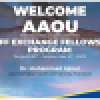- Posted by Nabila Meutia P...
- 04 May 2021
- PUSAT
- Total View 0
19th KSF Discussed Theme on the Implementation of Independent Campus That Supports Indonesia Development from the Outskirts
Knowledge Sharing Forum (KSF) held on Monday (03/05/2021) is the 19th series of the program. The KSF’s current theme is “the Implementation of Independent Campus (Kampus Merdeka) That Supports Indonesia Development from the Country’s Outskirts.” The event was held on-line through Zoom application and on YouTube UT TV which was coinciding with the National Education Day that presented a number of resourceful persons, namely the Chairman of People's Consultative Assembly of the Republic of Indonesia (MPR RI), H. Bambang Soesatyo, S.E., M.B.A.; Minister of Education and Culture, the Republic of Indonesia who was represented by Director General of Higher Education (Dirjen Dikti), Prof. Ir. Nizam, M.Sc., DIC, Ph.D.; The Presidential Chief of Staff of the Republic of Indonesia & Chairman of Alumni Association of the Universitas Terbuka (IKA-UT), Indonesian Armed Forces General TNI (Ret.) Dr. H. Moeldoko, S.I.P., who was represented by Chief Expert Staff of the Office of the President, Agung Hardjono, M.A., the Regent of Sangihe Islands, North Sulawesi Province, Jabes Ezar Gaghana, S.E, M.E., and as the moderator, the Director of the Center for International Relations Development and Partnership - the Institute of Education Quality Development and Assurance, Universitas Terbuka (PPHIK-LPPM UT), Dr. Sri Sediyaningsih, M.Si., who is familiarly called Dian Budiargo.
The program was opened with the remarks from UT’s Rector, Prof. Ojat Darojat, M.Bus, Ph.D. He expressed that Universitas Terbuka (UT) has served for more than 36 years in its efforts to realize the government’s mission in three aspects; first, ensuring fair and equal distribution of higher education access for all the people in general; second, providing the opportunity to the people in general, especially those who are working and wish to improve their competence and qualification in higher education, and, third, capacity building of state higher education institutions, particularly for SHS (senior high school) graduates. Currently, UT is making various breakthroughs, including, among others, its internal management and students service improvement. In the future, UT looks to prepare itself to be a University or Higher Education Institution as Incorporated Legal Entity (Perguruan Tinggi Negeri Berbadan Hukum or PTN BH) with broader autonomy and more agility in anticipating social changes or transformations that occur among the people. In addition to that, UT has also prepared the basic framework for “digital learning” of the national ecosystem so by the time when UT transforms into a Higher Education Institution as Incorporated Legal Entity (PTN BH), it will have already been supported by strong and solid information system and hence, the services to the public would become even much more advanced.

Subsequently, H. Bambang Soesatyo, S.E., M.B.A., said he would expect that the celebration of the National Education Day should serve as a momentum to make the commitment to making the nation’s goals into reality as mandated in the Constitution. With the grand theme of “moving together realizing the freedom to learn or serentak bergerak wujudkan merdeka belajar”, there is an important message that the responsibility to progress the well-distributed national education and to realize the most extensive educational access for the people in general would certainly require a great deal of support, collaboration, and cooperation among all elements of the nation. Referring to the today’s webinar theme, the definition of independent campus or kampus merdeka reiterates the concept that the learning process in universities or colleges must be essentially free from any forms of restrictions or access limitations. With technology advancement and current development, education in campus should not be restrained by space and time so it can be done anywhere and anytime. “In this respect, I highly appreciate Universitas Terbuka (UT) that has successfully outreached its students throughout the territory of Indonesia with the total number of more than 312 thousand active students and has made 1.8 million alumni thus far,” he said. He added, “as the first open and distance university in Indonesia, UT has always consistently provided the education services to the people in general of all social strata, who are from both urban and rural areas, and even more so, for Indonesian nationals who are currently living and working abroad.”
In his remarks, Prof. Ir. Nizam, M.Sc., DIC, Ph.D, illustrated that the challenges that Indonesia is now facing, as many experts have said, are the open opportunity for Indonesia to grow and become the world’s seventh economic power in the next decade. Along with the world’s progression in the 21st century where the global economy would be centered in Asia, more than 50% of the world’s trades are existent in Asia. This is a great opportunity for Indonesia it will become an advanced, thriving, and prosperous state. Global challenges that we are facing today are to make the 17 Sustainable Development Goals happen while, domestically, democratization progresses so fast and on the other hand, education for the people is still relatively low. In addition, extraordinary social transformation has taken place where hoaxes spark very often so the society is puzzled when they have to tell the difference between facts and hoaxes coming to them very intensely. Not to mention the gap and poverty that still exist, and on top of that, health standard fulfillment and education accomplishment are still low; all these are the challenges that higher education institutions face and where universities and colleges must become a water spring for the national development that can enlighten the people amid all the culture shock, social transformation, social media, and communication intensity which are just too many today.
Agung Hardjono M.A. appreciates UT which has successfully expanded the education starting from the country’s outskirts. For more than 36 years, UT has opened up the access for the public in general to university education programs in flexible and affordable ways in almost all the regions across Indonesia. In addition to that, in terms of open education model, UT was the first and ahead of other universities with their distance learning models, and UT’s open education models are now becoming the trend, especially during this Covid-19 pandemic as the open and distance learning models are the right answer for the development of e-learning education technology. These all make UT the role model for the preparedness of leading higher education institutions that can assist that will ensure the success in preserving the vision of Indonesia Onward (Indonesia Maju) by providing fair, equal, democratic, and evenly distributed education system that holds the nation’s values which are outreaching the outskirts of Indonesia. UT is also serving as the actual image of independent campus – freedom to learn (kampus merdeka – merdeka belajar) since UT optimizes its borderless education missions as it has 312 thousand students today spread across the entire territory of Indonesia. Freedom to learn or merdeka belajar through UT offers a great amount of benefits that the students can enjoy based on experimental learning process, wherein the students would not be contained in small spaces or rooms, yet they may study in open spaces having direct contact with their own people and dynamics of the outskirts of Indonesia. “UT has become the answers for the education issues and challenges across the regions of Indonesia’s outskirts as the students can freely produce and nurture their works and creativity without being required to abandon their primary duties in serving their country and families,” he uttered.
As a member of the society who lives in the border areas, Jabes Ezar Gaghana, S.E, M.E, shows his pride regarding to the theme brought up in this 19th KSF, which is the main focus of the event, especially in education sector. The Regency of Sangihe Islands itself covers 105 islands, 79 of which are uninhabited as, on the other hand, only 26 of them are inhabited and these islands share borders with the neighboring Philippines. UT has a number of students in this region. University Student Development Index or Indeks Pembangunan Mahasiswa (IPM) in the Regency of Sangihe Islands has increased by 70.73%. Several potential sectors exist in the Regency of Sangihe Islands, including fishery, agriculture, and tourism which will boost the economic growth of the region. One of the main tourist attractions in the Regency of Sangihe Islands is under water volcano, the only one in ASEAN. In education, Jabes Ezar Gaghana, S.E, M.E. brought up the main strategies that have been developed in the Regency of Sangihe Islands, consisting of human resources capacity building and optimalization of natural resources for local economic recovery.
In conclusion, Vice Rector for Institutional Development and Partnership Affairs of UT, Rahmat Budiman, S.S., M. Hum., Ph.D., really appreciates the speakers as well as the participating higher education institutions that took part in this KSF.






